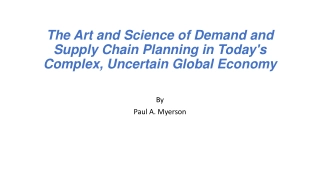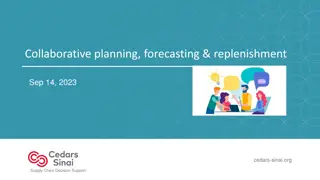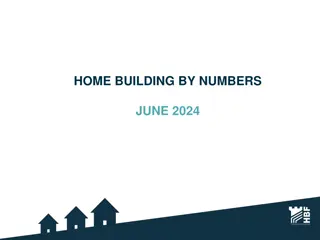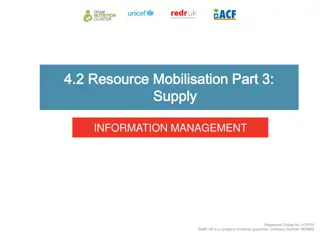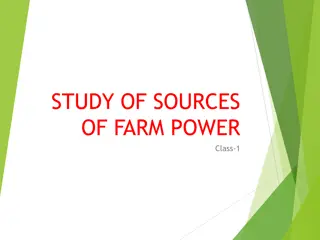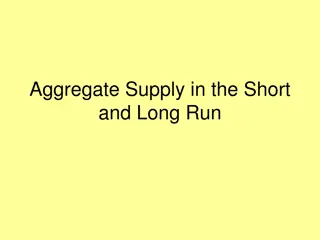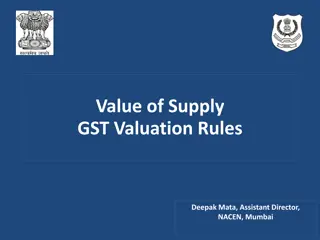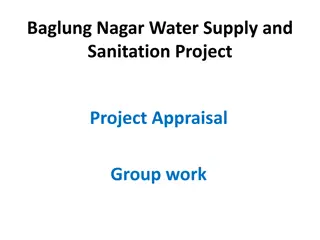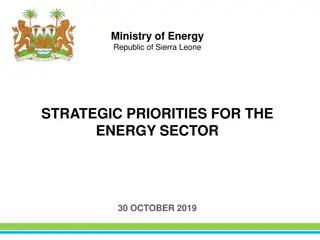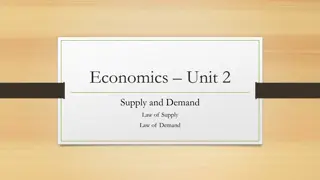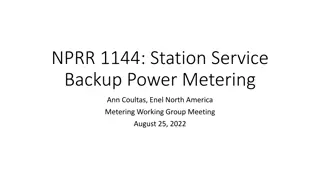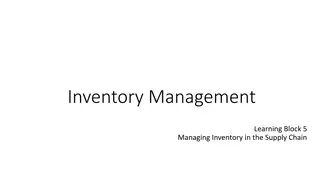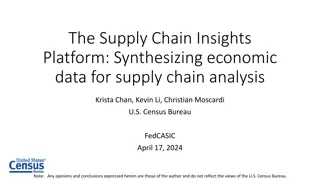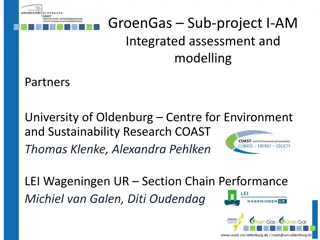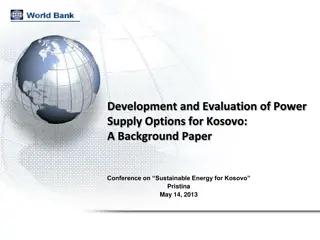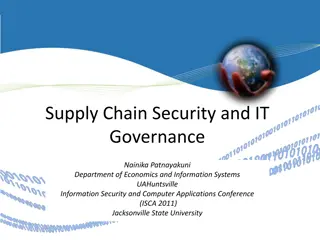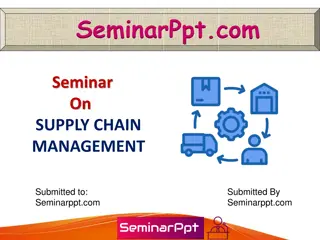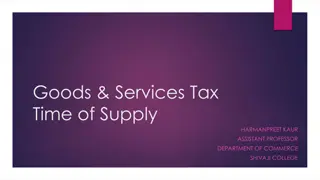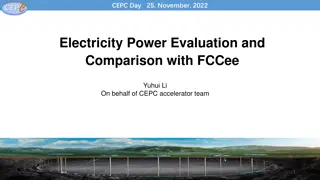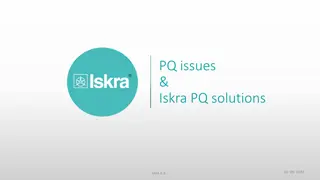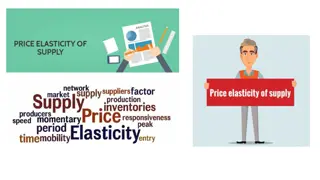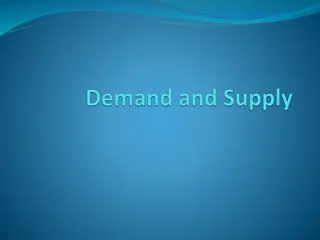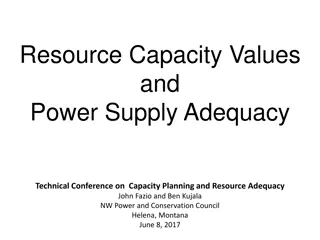The Art and Science of Demand and Supply Chain Planning: Navigating Today's Global Economy
Explore the intricacies of demand and supply chain planning in the modern global economy through the insightful content provided in this book. From achieving supply and demand balance to adapting to uncertainties like navigating white water rapids, the text delves into strategies for improving accur
2 views • 201 slides
Cisco Systems Fault Managed Power Portfolio Overview
Cisco Systems offers an industry-leading Fault Managed Power (FMP) patent portfolio comprising 24 active assets across seven INPADOC families. The portfolio includes patents supporting fault-managed power systems, PoE deployments, DC power distribution, DC-DC conversion, and HVDC connectors. The FMP
4 views • 4 slides
INVENTORY MANAGEMENT.
Managing inventory under ISO 15189 guidelines involves Quantity, Quality, and Process management. Key aspects include demand forecasting, inventory movement control, consumption planning, and ensuring fitness for purpose. Quantity management aims to balance demand and supply, manage supply economics
5 views • 13 slides
Enhancing Supply Chain Performance Through Collaborative Planning and Decision Support
This case study highlights how collaborative planning, forecasting, and replenishment strategies were implemented to improve supply chain performance at Cedars-Sinai. By addressing challenges such as low fill rates and lengthy cycle times caused by the pandemic and global events, a joint mission was
1 views • 14 slides
Water Management Strategies for Efficiency and Sustainability in Supply Systems
Customers with metered water supply are more water-efficient, promoting metering can increase awareness. Options include meter optants, metering on change of occupancy, supply pipe renewal, water efficiency, consumption data audits, and commercial water efficiency. Distribution management focuses on
1 views • 6 slides
Overview of Housing Supply and Economic Impact in the UK
England experienced a significant increase in housing supply in 2022/23, with new build completions and conversions contributing to a record-breaking net supply of 320,000 homes per year. Despite challenges in planning permissions and government interventions, the home building industry supported th
2 views • 14 slides
Responsibilities and Collaboration in Supply Management for Emergency Response
The role of various stakeholders in supply management for emergency response is crucial. The Nutrition Cluster Coordinator (NCC) coordinates with partners to identify and address supply needs, while Information Management Officer (IMO) supports in calculating caseloads and consolidating supply reque
1 views • 24 slides
Overview of Farm Power Sources and Utilization in Agriculture
Farm power sources in agriculture include human, animal, mechanical, and renewable energy. Human power is costly but versatile, while animal power is traditional and provides manure. Mechanical power from tractors and engines is efficient. India's farm power sources reflect a mix of traditional and
0 views • 12 slides
Understanding Aggregate Supply in the Short and Long Run
Aggregate Supply in the short and long run is crucial in understanding the relationship between the economy's price level and the total quantity of goods and services produced. In the short run, sticky wages and production costs play key roles in determining supply levels, while in the long run, cha
0 views • 16 slides
Power Transmission and Distribution Network of Tunnel Boring Machine Site
The power transmission and distribution network at the tunnel boring machine (TBM) site involves electrical motors, generators, transformers, and power cables to efficiently operate TBMs for tunnel construction. The system includes multiple generators, transformers, junction boxes, and power distrib
1 views • 7 slides
Understanding GST Valuation Rules and Consideration in Supply
Explore the concept of consideration in relation to the supply of goods or services under the CGST Act, along with indicators of consideration, supply without consideration scenarios, and implications for GST valuation. Learn about the significance of direct link between supply and consideration, tr
0 views • 39 slides
Understanding the Law of Supply in Economics
The Law of Supply states that as the price of a good or service increases, the quantity supplied by producers also increases, assuming all other factors remain constant. This fundamental economic principle highlights the relationship between price and supply, emphasizing how producers strive to maxi
1 views • 4 slides
Baglung Nagar Water Supply and Sanitation Project Overview
The Baglung Nagar Water Supply and Sanitation Project aims to upgrade the existing water supply system in Baglung urban area by adding new water sources, expanding the distribution system, and fulfilling the water demand of the growing population. With a focus on sustainability and efficiency, the p
0 views • 17 slides
Strategic Priorities for Sustainable Electricity Generation in Sierra Leone
The Ministry of Energy in Sierra Leone has outlined strategic priorities to ensure sustainable electricity generation and supply in the short, medium, and long term. Key actions include implementing an integrated electricity plan, identifying externally funded projects for power supply, and addressi
0 views • 19 slides
Understanding Supply and Demand in Economics
Explore the fundamental concepts of supply and demand in economics, including the laws that govern them. Learn about the characteristics of free markets, the factors that determine supply, and how prices influence the quantities supplied and demanded. Gain insights into the law of supply and law of
1 views • 21 slides
Proposal NPRR.1144: Station Backup Power Requirements Exception
NPRR.1144 proposes an exception allowing up to 500kW of auxiliary load to connect to a Transmission/Distribution Service Provider's facilities through a separately metered point using an emergency load transfer switch. This exception aims to provide flexibility in redundant power supply options for
0 views • 4 slides
Managing Inventory in the Supply Chain: Tools, Techniques, and Strategies
This learning block delves into the crucial aspects of managing inventory in the supply chain, addressing demand variability, the bullwhip effect, and the role of third-party systems. Learners will explore the significance of inventory in supply chains, discuss tools for effective inventory manageme
0 views • 23 slides
Introduction to Supply Chain Management
Explore the key components of supply chains, the importance of supply chain management technology, and strategies to overcome challenges. Learn about supply chain visibility, the structure of supply chains, and the three segments - upstream, internal, and downstream. Discover how organizations acces
1 views • 29 slides
Enhancing Supply Chain Insights Through Holistic Data Synthesis
Synthesizing economic data for comprehensive supply chain analysis, this talk by Krista Chan, Kevin Li, and Christian Moscardi from the U.S. Census Bureau discusses the goals, challenges, supply chain interests, data sources, and desired functionalities to present a holistic view of product supply c
0 views • 16 slides
Integrated Assessment and Modelling for Sustainable Biogas Supply Chains
The GroenGas sub-project I-AM focuses on integrating and synthesizing results from various sub-projects to assess innovations and improvements in biogas supply chains. The project aims to implement powerful options for sustainable supply chain management, including performance analysis, benchmarking
0 views • 14 slides
Power Supply Options for Kosovo: Development and Evaluation
This background paper from the Conference on Sustainable Energy for Kosovo delves into the development and evaluation of power supply options for Kosovo. It covers the study approach, power demand forecast methodology, assumptions, and estimated supply to meet forecast power demand, emphasizing the
0 views • 19 slides
Understanding Supply in Economics
Explore the definition of supply, changes in supply versus changes in quantity supplied, non-price determinants of supply, the supply curve, key outcomes to know, and real-world examples affecting gasoline supply. Develop a strong foundation in economic concepts with detailed explanations and graphi
0 views • 33 slides
Understanding Supply in Economics
Explore the concept of supply in economics, including its definition, determinants, and graphical representation. Learn about the law of supply, non-price factors affecting supply, and key terms such as market supply and horizontal summation. Understand the difference between a change in quantity su
0 views • 30 slides
Understanding Supply in Economics
Supply in economics refers to the quantity of goods that firms are willing to produce at different prices over a specific period. The Law of Supply states that as prices increase, the quantity supplied by firms also increases. Individual and market supply curves illustrate this relationship, with ot
0 views • 28 slides
Understanding Supply and Costs of Production in Economics
Supply in economics refers to the availability of goods and services in the market, influenced by factors like the law of supply, supply schedules, and supply elasticity. Cost of production involves considering marginal benefits and costs in determining output levels. These concepts are vital in und
0 views • 20 slides
Enhancing Supply Chain Security and IT Governance: An Overview
This presentation delves into the critical aspects of supply chain security and IT governance, highlighting the synchronization of IT decisions across supply chains, global supply chain concerns, the cost implications of supply chain security lapses, and the need for more research and strategic alig
0 views • 28 slides
Understanding Supply Chain Management: Key Concepts and Processes
Supply chain management (SCM) involves the centralized management of goods and services flow, covering processes from raw materials to final products. By efficiently managing the supply chain, companies can reduce costs and improve product delivery. This seminar presentation explores the definition,
0 views • 24 slides
Understanding Goods and Services Tax (GST) Time of Supply
Goods and Services Tax (GST) time of supply, also known as TOS, determines when GST becomes payable on a supply. This includes various elements like agreement to supply, delivery of goods, provision of services, invoice issuance, payment, and recording of payments. The time of supply for goods and s
0 views • 26 slides
Comparison of Electricity Power Systems Between CEPC and FCCee
The evaluation and comparison of electricity power systems between the CEPC and FCCee accelerators reveal the power breakdowns, RF power consumption, magnet power supply, and overall power usage. Differences in power consumption for various components such as RF, magnets, and vacuum systems are high
0 views • 19 slides
Canadian Forces Logistics Association Ottawa Chapter Update
The Canadian Forces Logistics Association Ottawa Chapter provided updates on supply chain management, officer courses, qualification updates, and riggers' career path. They discussed initiatives such as Supply Update Roadmap, Supply Relationships Geographic Map, Supply Officer and Supply Tech update
0 views • 11 slides
ARM Microcontroller Power Supply, Reset, and Clock Control Overview
This overview covers the power supply, reset control, and clock sources for ARM microcontrollers, focusing on aspects such as power supplies, battery backup, voltage regulator operation modes, and power supply supervisor functions. It discusses essential details like operating voltages, backup domai
0 views • 27 slides
Power Quality Monitoring and Evaluation in Modern Energy Systems
Power quality is crucial for stable operations in energy systems. This content discusses issues in power supply, reasons for measuring power quality, consequences of bad power quality, methods for measuring power quality, and evaluation techniques for compliance reports. Tracking power quality param
0 views • 21 slides
Optical Fiber Calibration System & Adaptive Power Supply by J. Cvach
Introduction to an optical fiber calibration system and adaptive power supply developed by J. Cvach from the Institute of Physics, ASCR, Prague. The system includes an LED driver, notched fibers, and adaptive power supply for various applications, such as the calibration of the CALICE AHCAL and LHCb
0 views • 13 slides
China-Africa Supply Chain Cooperation: Challenges and Opportunities
China-Africa Supply Chain Cooperation presents both challenges and opportunities for development. The growth of China-Africa supply chain is crucial, considering Africa's participation in the global supply chain mainly focused on providing primary products. The strategic importance of this relations
0 views • 19 slides
Understanding Price Elasticity of Supply in Economics
Price elasticity of supply measures how much the quantity supplied responds to changes in price. It can be inelastic (quantity supplied responds slightly), elastic (quantity supplied responds substantially), or unit-elastic (price elasticity of supply equals 1). Various determinants like the passage
0 views • 16 slides
Understanding Livestock Economics: The Law of Supply Explained
Exploring the concept of supply in livestock economics, this lecture covers theories, individual supply schedules, market supply schedules, and the law of supply. Dr. Puspendra Kumar Singh delves into the relationship between commodity prices and producer supply, offering insights into market dynami
0 views • 30 slides
Understanding Leadership and Power Dynamics
Power and leadership are interconnected concepts, with power being the measure of a person's ability to influence others. Leaders have power in various situations, but it does not necessarily mean having power over people. Effective leaders balance their use of power with knowledge and trust, knowin
0 views • 9 slides
Understanding Demand and Supply in Economics
Demand and supply are core concepts in economics, driving the market economy. Demand reflects the desire for a product at different prices, with an inverse relationship between price and quantity demanded. Supply, on the other hand, represents what producers are willing to offer at various prices, w
0 views • 7 slides
Power Supply Board Functions in LED TVs: How It Works and Why It’s Important
Learn how the power supply board in LED TVs works, its importance for stable performance, energy efficiency, and protecting key components from damage. \/\/worldhealthorganization.co\/power-supply-board-functions-in-led-tvs-how-it-works-and-why-its-i
7 views • 1 slides
Resource Capacity Values and Power Supply Adequacy Conference Highlights
Explore insights from the Resource Capacity Values and Power Supply Adequacy Technical Conference, covering topics like integrated vs. standalone capacity values, utilizing hydro storage to increase capacity, and the 2021-22 Adequacy Summary. Learn about the importance of integrated capacity values
0 views • 9 slides
